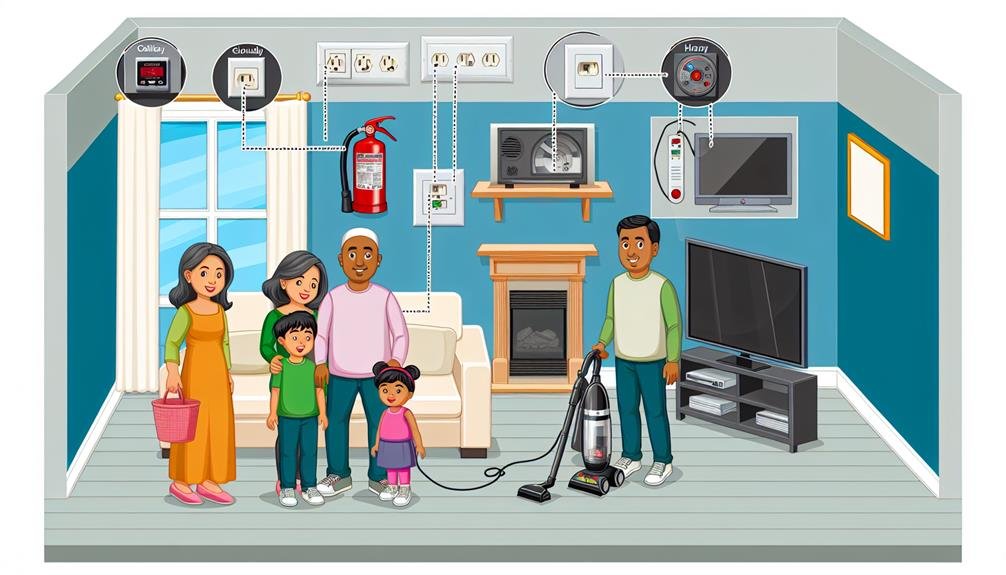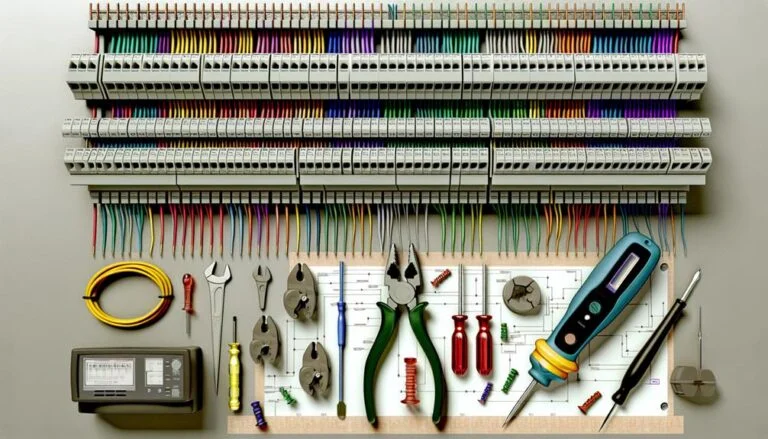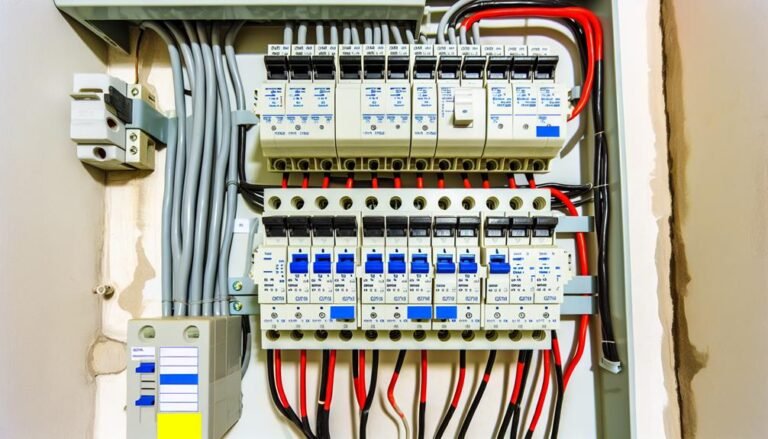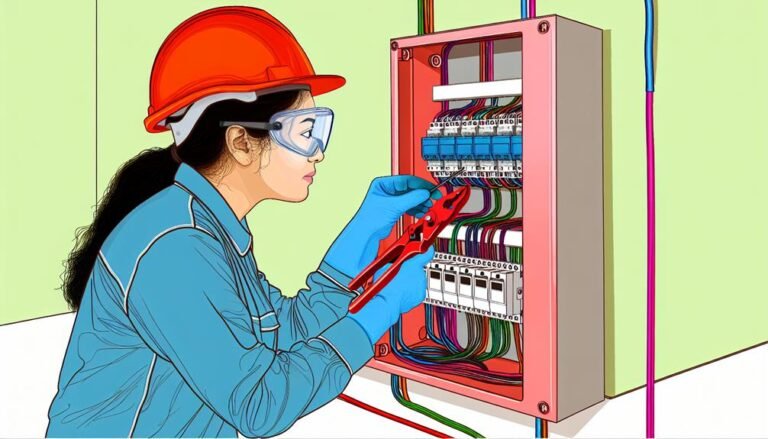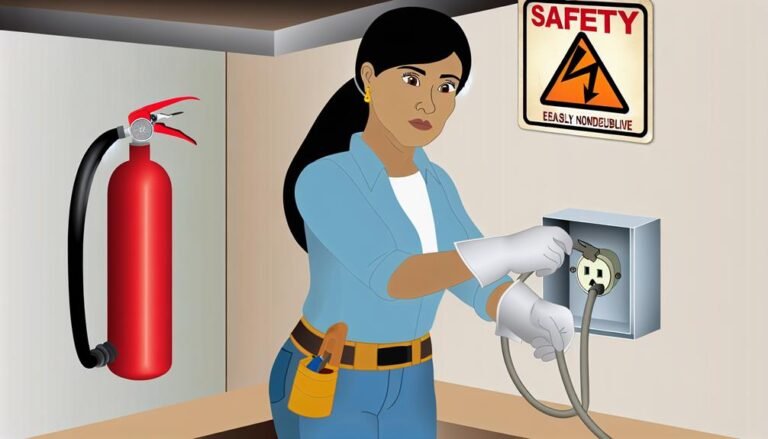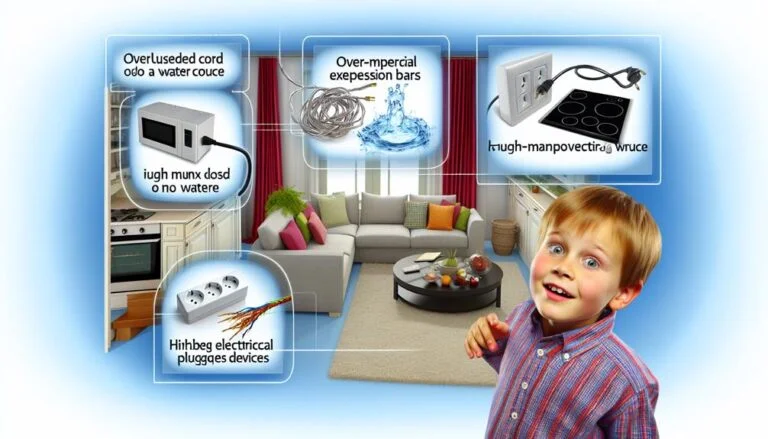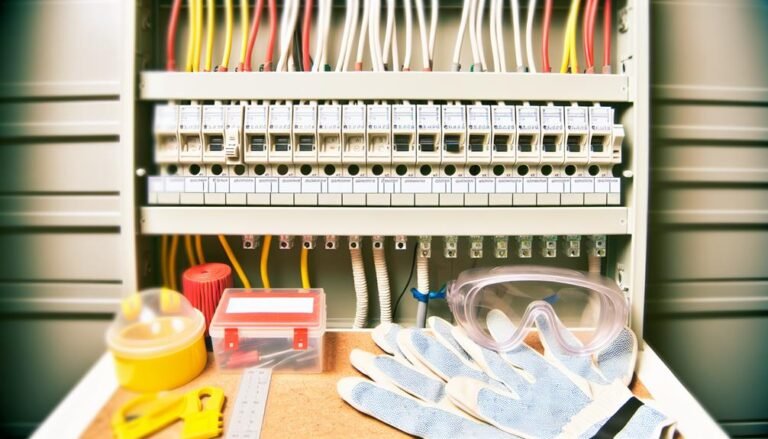Imagine coming home after a long day at work, looking forward to a relaxing evening. As you enter your house, you notice a peculiar burning smell. Your heart starts racing as you quickly realize that something is not right.
Electrical hazards in residential settings can be unexpected and dangerous, posing a significant risk to your safety and the well-being of your loved ones. However, fear not! In this simple guide, we will uncover practical steps and essential tips to help you prevent these hazards and ensure a secure environment for your home.
So, let's dive in and discover how you can safeguard your household from potential electrical dangers.
Key Takeaways
- Teach children about electrical safety precautions and keep them away from electrical outlets and appliances.
- Regularly inspect and maintain wiring to prevent electrical fires caused by outdated or faulty connections.
- Understand the capacity of electrical circuits and avoid overloading them by distributing devices across multiple circuits and avoiding daisy-chaining power strips.
- Perform routine maintenance on electrical appliances and devices to reduce the risk of electric shocks, fires, and property damage.
Common Electrical Hazards in Homes
To protect yourself and your household from potential dangers, it's crucial to be aware of the common electrical hazards that can exist in homes. By understanding these hazards, you can take the necessary precautions to ensure the safety of your loved ones.
One important aspect of electrical safety is taking measures to protect children. Children are naturally curious and may be unaware of the dangers associated with electricity. It's essential to teach them about electrical safety precautions such as keeping fingers and objects away from electrical outlets, never touching electrical appliances with wet hands, and never inserting objects into electrical sockets.
Another common electrical hazard in homes is the risk of electrical fires. Identifying and dealing with electrical fire hazards is crucial for the safety of your household. One way to prevent electrical fires is to avoid overloading electrical outlets and extension cords. Overloading can lead to overheating and cause a fire. It's also important to regularly inspect electrical cords for any signs of wear or damage and replace them if necessary. Additionally, installing smoke detectors and fire extinguishers in your home can provide an extra layer of protection against electrical fires.
Wiring Issues and Potential Dangers
Wiring issues in residential properties can pose significant dangers if not addressed promptly and properly. Faulty wiring is one of the leading causes of electrical fires in homes. It's crucial to understand the potential dangers associated with faulty wiring and take necessary precautions to prevent accidents.
One common wiring issue is outdated or deteriorated wiring. Over time, the insulation surrounding the wires can wear out, exposing them and increasing the risk of electrical fires. Additionally, faulty connections or loose wires can lead to overheating and spark formation, which can ignite nearby flammable materials.
Another potential danger is improper installation. If electrical wiring isn't installed correctly, it can cause short circuits or overload the electrical system, leading to electrical fires. It's essential to hire a qualified electrician to ensure proper installation and regularly inspect the wiring for any signs of damage or wear.
To prevent wiring issues and potential dangers, it's crucial to schedule regular maintenance and inspections of your electrical system. Look out for warning signs such as flickering lights, frequently tripped circuit breakers, or burning smells. If you notice any of these signs or suspect faulty wiring, it's important to contact a licensed electrician immediately.
Overloaded Circuits and Power Strips
Overloaded circuits and power strips can pose serious risks if not properly managed. To ensure electrical safety in your home, it's important to be aware of the potential dangers and take necessary fire prevention measures.
First and foremost, it's essential to understand the capacity of your electrical circuits. Each circuit is designed to handle a specific amount of electrical load. Overloading a circuit by plugging in too many appliances or devices can lead to overheating, which increases the risk of electrical fires. To avoid this, distribute your electrical devices across multiple circuits and avoid using high-power appliances on the same circuit simultaneously.
Power strips are convenient for providing additional electrical outlets, but they can also contribute to overloading circuits if not used correctly. It's crucial to avoid plugging too many devices into a single power strip, as this can exceed its capacity and create a fire hazard. Additionally, avoid daisy-chaining power strips together, as this can overload the circuit and increase the risk of electrical fires.
To prevent overloaded circuits and power strip-related hazards, follow these electrical safety tips: regularly inspect your power strips for any signs of damage or overuse, avoid using extension cords as a permanent solution, and unplug any unused appliances or devices to reduce the electrical load.
Faulty Electrical Appliances and Devices
Faulty electrical appliances and devices pose significant risks to residential electrical safety. It is crucial to understand the importance of routine maintenance in preventing electrical fires. Regularly inspecting and servicing your appliances and devices ensures they are in good working condition, reducing the risk of malfunctions that could lead to electrical hazards.
To emphasize the importance of routine maintenance, here is a table showcasing the potential dangers of neglecting this crucial aspect of electrical safety:
| Neglected Maintenance | Potential Hazards |
|---|---|
| Faulty wiring | Electrical fires |
| Loose connections | Electric shocks |
| Overheating | Property damage |
When appliances and devices are not properly maintained, their internal components can deteriorate over time. Loose connections, faulty wiring, and overheating can all lead to electrical fires that can quickly engulf your home, putting your loved ones and belongings at risk.
To prevent these hazards, make it a habit to inspect and maintain your electrical appliances and devices regularly. Check for any signs of wear and tear, such as frayed cords or loose plugs. Ensure that all electrical connections are secure and that there are no unusual odors or sparks during operation.
Outdoor Electrical Hazards in Residential Areas
To ensure the safety of your residential outdoor areas, it's important to be aware of potential electrical hazards that may exist. Here are some key points to consider:
- Poolside electrical safety: Pools are a popular feature in many residential areas, but they can also pose electrical hazards if not properly maintained. Make sure all electrical equipment, such as pumps and lighting, is installed by a qualified electrician and conforms to safety standards. Keep electrical cords and appliances away from water to prevent the risk of electrocution. Regularly inspect and maintain the electrical systems around your pool to ensure they're in good working condition.
- Outdoor lighting hazards: Outdoor lighting is a great way to enhance the beauty and functionality of your residential outdoor areas. However, it can also present hazards if not installed and maintained properly. Ensure that all outdoor lighting fixtures are weatherproof and designed for outdoor use. Use proper wiring techniques and install ground fault circuit interrupters (GFCIs) to protect against electrical shocks. Regularly check and replace any damaged or worn-out lighting components to prevent electrical malfunctions.
- Inspect for potential hazards: Regularly inspect your residential outdoor areas for any potential electrical hazards, such as exposed or damaged electrical wiring, loose connections, or overloaded circuits. Address these issues promptly by hiring a qualified electrician to make the necessary repairs or upgrades.

